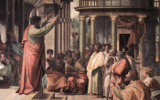Article
|
Whose Fan is in His Hand "I indeed baptize you with water unto repentance: but he that cometh after me is mightier than I, whose shoes I am not worthy to bear: he shall baptize you with the Holy Ghost, and with fire: Whose fan is in his hand, and he will throughly purge his floor, and gather his wheat into the garner; but he will burn up the chaff with unquenchable fire." -- Matthew 3:11-12 Posted by Joey Kelly John bursts upon the scene after 400 years of prophetic silence and has a shattering message for all Israel: the Messiah is coming and it's time to repent. Many heed his words but the religious crowd wanted nothing to do with confession of sins. In answering these critics he tells more about Christ's ministry and the great baptism in the Holy Spirit which would fall from heaven fifty days after the Lamb of God has died for the sins of the world and is risen from the grave. The Baptist further warns about God's wrath that is surely coming upon the children of disobedience(Ephesians 5:6). We as Pentecostals rejoice in the power of God that was given to the Church to help us carry the gospel unto the uttermost part of the earth(Acts 1:8). We know that we benefit personally from this enduement (1 Corinthians 14:4) but we sometimes overlook the winnowing process the Holy Spirit desires to do in us. It is that work of sanctification that this issue of Upper Room Report aims to explore. As grain is harvested after the growing season, there is a series of steps that must take place. First, the stalks are cut down and gathered into bundles. These bundles are then beaten to dislodge the individual kernels of wheat, barley or other grain. The farmer can then rejoice at this point as his harvest has been gathered in, but a few more tasks remain before he can rest and enjoy the fruit of his labor. The kernels have been shaken loose from their stalks and are collected, but the little bits of leaf, stem, outer husk and whatnot (collectively known as chaff) have to be separated from the grain. A common way of separating the wheat from the chaff is to put the mixture into a sheet and repeatedly toss everything into the air so that the breeze is able to blow away the chaff, leaving the edible part of the plant. The grain is now ready to be used for food. In order to make bread from the harvested grain, the kernels have to be ground, a process which pictures brokenness, suffering and other means of sanctification in the life of the believer. The farmer and all with him can now fill their bellies, but one more task remains: the chaff must be disposed of lest it somehow recontaminate the purified kernels. Chaff is typically burned, and this final step of the harvest is mentioned prominently in John's message. We generally take this to mean that the wicked find themselves eternally consigned to hell (Psalm 9:17) and sin no longer troubles God's elect, themes that are in keeping with many other end-time scriptures. The Spirit's work of sanctification in our lives is often painful but its necessity cannot be argued against. God's word is clear: If any man will come after me, let him deny himself, and take up his cross, and follow me(Matthew 16:24). Create in me a clean heart, O God; and renew a right spirit within me(Psalm 51:10). And I will turn my hand upon thee, and purely purge away thy dross, and take away all thy tin(Isaiah 1:25). These and many other verses speak of the believer being transformed into the image of God's son Jesus Christ who gave His life for us (Romans 8:29, Galatians 2:20). |
